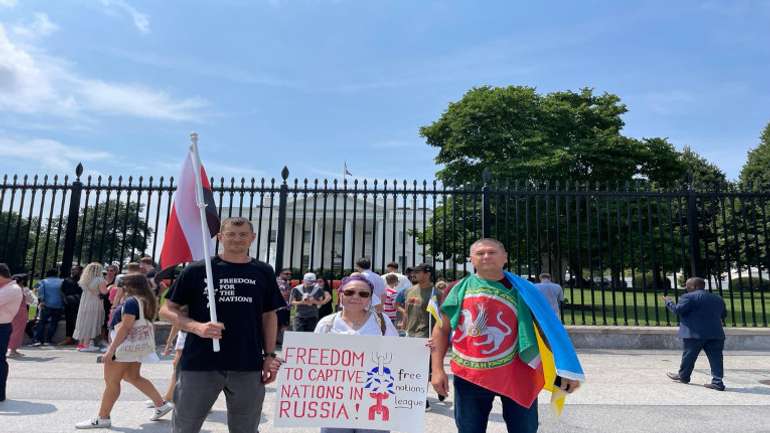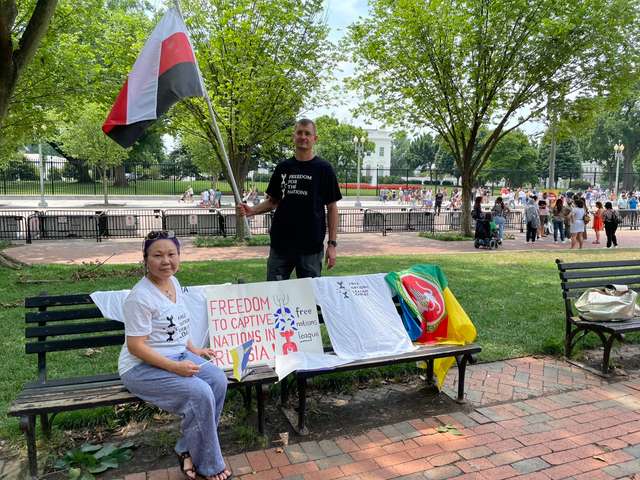США просять про підтримку поневолених Москвою народів

Активісти національних рухів просять підтримати їхні народи у реалізації права на самовизначення
Ліга вільних націй, що об’єднала представників поневолених Кремлем народів росії, звернулася до президента США Джо Байдена. Активісти національних рухів просять підтримати їхні народи у реалізації права на самовизначення.
Лист оприлюднено в понеділок, 18 липня.
“Нашим зверненням ми долучаємось до проведення Тижня поневолених народів, який щорічно проходить у США з моменту прийняття у 1959 році відповідної резолюції Конгресом. З причини візиту президента Байдена на Близький Схід, та, вірогідно, у зв’язку з російським вторгненням в Україну, традиційний брифінг президента на галявині біля Білого дому, що відкривав Тиждень поневолених народів, не відбувся. Однак ми все одно вирішили приїхати до Вашингтона, оскільки важливо було заявити нашу позицію та позбавити монополії Москву, що претендує одноосібно виступати від імені наших країн. Ми не бачимо майбутнього наших народів в складі росії і не хочемо відповідати за військові злочини Кремля”, – розповідає представник фіно-угорського народу ерзя Віталій Ромашкін.
Віталій приїхав до Вашингтона разом із соратниками по Лізі вільних націй – буряткою Раджаною Дугар-ДеПонте і татарином Іршатом Хабі. Вони тримали в руках ерзянський національний прапор, а також прапори Бурятії і Татарстану.
“Мені як бурятці боляче усвідомлювати, що Кремль використовує бурятських хлопців для досягнення своїх злочинних цілей – захоплення нових територій та розширення кордонів імперії. Власне, війна – це все, що Москва здатна запропонувати хлопцям з бурятських сіл. Гинути як гарматне м’ясо на черговій загарбницькій війні росіян. Я не бажаю такого майбутнього для Бурятії та свого народу. Тому сьогодні ми тут не лише для того, аби засудити військову агресію проти України, але й щоб шукати підтримки серед американського суспільства.
Ми, автохтонні народи, що проживають у російській федерації, фактично є заручниками Москви та цього режиму. Нам лишили вибір: або воювати, або сісти до в’язниці, якщо ми не підтримуємо російську агресію”, – заявила Раджана Дугар-ДеПонте.
Татарський політичний емігрант Іршат Хабі поділився планами Ліги на найближчий тиждень: “20 липня ми проведемо онлайн прес-конференцію з учасниками інших національних рухів, що входять до ЛВН. Татари, башкири, буряти, інгерманландці, козаки, калмики, ерзяни розкажуть про цілі та задачі Ліги, дадуть відповіді на питання журналістів. Вже 23 липня ми вийдемо на мітинги в різних країнах світу, де заявимо про наше право на самовизначення – право, яке в нас відібрали силою. Мітинги, зокрема, будуть і в США – в Нью-Йорку, Філадельфії та Клівленді.
Сьогодні ми у тому ж стані, що й Україна, Естонія, Литва або Латвія 40 років тому. Ми будемо домагатися деколонізації, і в цій боротьбі нам необхідна підтримка розвинених демократичних країн”, – сказав Хабі.

Відкритий лист Ліги вільних націй до Джо Байдена
US President
Joseph R. Biden Jr.
The White House
1600 Pennsylvania Avenue NW
Washington, DC 20500
Dear Mr. President,
For 63 years the presidents of the United States have been proclaiming an annual Captive Nations Week, which testifies to the commitment by the United States to protect the fundamental rights, freedoms, values, and principles proclaimed by the UN – liberty, democracy, the right of nations to self-preservation, development, and self-determination.
The year 2022 has shown that it is not yet time to abandon the ideas of fighting for the freedom and liberation of peoples from colonial dependence and the power of repressive regimes.
Moscow launched a full-scale invasion of Ukraine to destroy the state and the people that have already been fighting against Russian aggression and occupation for eight years. The Kremlin is making great efforts to reoccupy Ukraine and take away freedom from the people who declared independence 4 times in the 20th century (1918, 1939, 1941, 1991) and supported their desire to form an independent state by making huge sacrifices in their lives. Today, the Ukrainian nation is fighting for the preservation of its national state and free development, a right which is denied by the current Russian government, which has established a full-fledged reactionary fascist regime in its own country.
The Ukrainians, who themselves escaped from the embrace of the Soviet empire in 1991, are well aware of the dangers of returning to the past. They have before their eyes a tragic example in the form of the silent soldiers of the captive non-Russian peoples fighting in the Russian army whom the Putin regime mercilessly condemns to death in a war that is contrary to all international legal norms. The war unleashed by the Kremlin reminds us of the true meaning of the words “freedom” and “one’s state”. Ukrainians are fighting for their freedom and their state. The nations held captive by the Russian empire are forced to fight for the interests of the state/government hostile toward them and for the preservation of the dominance of the Russian criminal mafia elite that has usurped power. The twisted logic of the situation is that these non-Russian soldiers shed their blood to take away freedom from the Ukrainians, who, unlike their people, have been lucky enough to achieve it as a result of centuries of struggle against Russia.
Most of the territory of present-day Russia consists of the territories of dozens of captive nations and of hundreds of indigenous peoples which were conquered, occupied, and annexed in whole or in part: the Kazan Khanate, the Astrakhan Khanate, the lands and states of the peoples of the North Caucasus, Karelia, Erzyan Mastor, Buryat-Mongolia, the Kalmyk Khanate, the lands of the Nogais, Circassians, the peoples of Siberia and the Russian Far East. In the territories occupied by Moscow, the most common colonial policy of exploiting natural resources is carried out: hydrocarbons, ores of ferrous, non-ferrous, and rare earth metals, precious stones, many kinds of chemical elements, the soil, forests, wildlife, and other resources are exploited for hundreds of billions of dollars annually. Moscow takes all this wealth. This money is used to support the administrative and repressive apparatus of the imperial Russian state, its law enforcement agencies, its army, Russian cultural institutions, and its education system. The populations of the occupied territories receive the smallest amount from this cash flow, which is not enough even for their current needs.
The available statistics of those who died in the war demonstrate disproportionately high rates of casualties among representatives of the national republics comprising the Russian Federation – both in absolute terms and per capita. The loss of a significant number of young men carries a special danger for the captive nations in Russia, whose future as unique ethnic and cultural communities are already in danger of disappearing as a result of Russia’s policy.
However, the war is not the main problem of the captive nations under Putin’s state. Their national rights, provided for by international institutions (the UN, the Council of Europe) and the Constitution of the Russian Federation, are constantly violated. The state languages of the republics are being purposefully ousted from the sphere of education and from public life, in general, to be replaced by the Russian language. National and regional parties are banned. The republics are losing the powers, rights, and freedoms guaranteed to them by the Russian Constitution and federal treaties between them and Moscow. National NGOs are closed by the order of the authorities and the security and intelligence services. Activists of national movements in Russia are persecuted by the state bodies and subjected to repressions and anonymous reprisals to a much greater extent than the well-known figures of the main Russian opposition.
The majority of citizens of non-Russian nationalities in Russia are discriminated against, restricted in their civil rights, and subjected to systematic insults. Russia, as a result of the policy of the Putin regime, has ceased to be a Federation, turning into a centralized state, where almost all issues of regional and local life are resolved in faraway Moscow. Decision-making competence on most issues, including the internal development of any region, including national ones, as well as the “preservation” and “development” of captive nations and indigenous people, belongs to the so-called federal center. All rights to regulate, dispose and manage the legislative and regulatory sphere, budgetary funds, use of land, subsoil, and basic natural resources belong to the Russian authorities, and not to the regions.
In vast areas, the captive nations and indigenous peoples have been displaced, reduced to a pitiful minority, or simply annihilated. In these territories, the local population has been assimilated and/or replaced by Russians and representatives of other Slavic peoples (e.g. in the Finno-Ugric North, in Kuban, in the lands of the Don Cossacks, the Volga region, Siberia, the Russian Far North, the Baikal region, the Russian Far East). All this did not happen naturally, but as a result of the purposeful policy of the predominantly Russian state in its various forms – the Moscow principality, Muscovy, the Russian Empire, the USSR, and the Russian Federation.
Each captive nation living on its ancestral lands within the Russian Federation has constantly lost and continues to lose its population, territory, language, cultural characteristics, self-government, natural resources, security, etc. As we watch the flourishing of the national cultures, the economies, and the democracies in the freed republics of the former Soviet Union, we must conclude that only true sovereignty can save a people from assimilation and extinction.
Sharing the values of modern democracy,
feeling a sense of belonging to the goals of the Captive Nations Week,
wishing a worthy future for our descendants,
We, the representatives of the national movements of the nations held captive by the Russian Federation, appeal to you with the following requests:
To support the nations held captive by the Russian Federation in exercising their right to self-determination;
To condemn the Kremlin’s policy of assimilation and acculturation of the non-Russian peoples in Russia;
To demand that the Putin regime stop persecuting ethnic activists and immediately release all political prisoners;
To recognize the natural resources in the homeland of the nations held captive by Russia as their national treasure;
To condemn the use of non-Russian peoples by the Russian empire in a war that is foreign to them;
To impose sanctions against Russian officials who violate the rights of the non-Russian peoples in Russia;
To introduce into the text of the law Public Law 86-90 Captive Nations Week Resolution the names of the nations held captive by Russia, a list of which we are ready to present separately;
To consider the possibility of organizing and holding an International Tribunal for Communism.
Freedom for Nations! Freedom for Individuals!
Please accept, our highest regards!
The representatives of the national movements:
Bashkir – Ruslan Gabbasov;
Buryat – Dorzho Dugarov, Rajana Dugar-DePonte;
Cossack – Vyacheslav Demin;
Kalmyk – Vladimir Dovdanov, Batyr Boromangnaev, Erentsen Dolyaev, Albert Sharapov;
Nogai – Edige Bekmurzaev;
Tatar – Rafis Kashapov;
Erzya – Syres Bolyaen, Vitaly Romashkin, Genio Markon.


